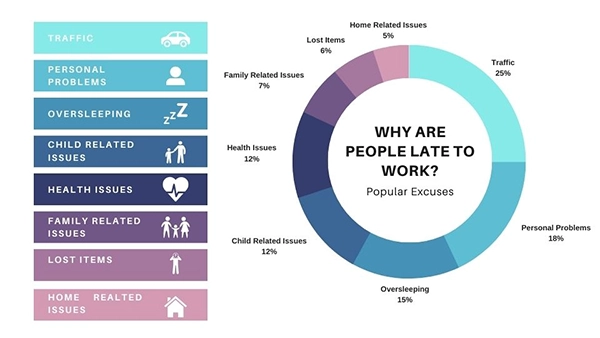Do you ever think how much tardiness of staff and less interest in work can damage your company?
As a corporate senior manager for the past 13 years, I have seen many employees struggling to manage the chaos of office timings.
I was reading an article by HR Daily Advisor, in which I completely agree with the statement that says,
38% of employees ages 18-34 are late at least once a month, compared to 36% of those 35-44 and 14% of those 45 and older.
But how can managers and supervisory teams handle these situations to improve the efficiency of team members and coordination in workflow?
Be patient because by reaching the finish line of this article, I assure you that you will get a complete solution to this issue.
Let’s gear up and accelerate!
I always ask a question to myself, why employees take leaves on a certain pattern or specific day and dates?
This is because every person faces some comfort issues and a dissatisfactory mind at some point in the week. These problems mostly occur when a person is suffering from personal issues and workload stress.
In my opinion, conventional conversations and suppressing workload can actively solve these problems and improve efficiency actively.
According to my several observations, reassessing the task load of employees can rapidly improve operational performance. These examinations can give a better overview of the weak points and strengths of employees at the same, which results in maintaining discipline and punctuality of the staff regarding deadlines.
Take my advice, by using good employee scheduling software you can access a detailed observation of your employee’s work patterns, inefficiencies, and strengths in a documented form.
Did you know? According to a survey conducted by workforce management company Work Yard:25 percent of late employees were delayed by traffic.18 percent of employees were late to work due to personal difficulties.12 percent of workers were late to work due to child-related issues. (Business News Daily)
if you ask me, balancing accountability and flexibility is the major task in the corporate environment. You have to handle staff sometimes readily by concerning their mental and physical health so that they can work effortlessly.
A good schedule flexibility plan has to be precise on the work ethics and timely submissions of tasks while keeping the preferences and time management of the employers in mind.

These are some major problems, which are shown in this image, that can happen to an employee when he/she is not playing their role efficiently.
I genuinely think if you are delaying taking action on workers who are tired and losing track while performing their tasks, then you are failing as a manager to be honest.
This ignorance often leads to the destruction of team coordination and creates a feeling of favoritism in the minds of other workers, which contributes to failing deadlines of clients and crumbling workflow in companies.
if you follow my consideration, the reactive approach can give solutions to the employer’s problems temporarily, which may arrive again sooner or later. This includes addressing job dissatisfaction and providing old conventional solutions like salary increments or increased break times, which in the long run provides you with loss.
But, in the proactive approach, you can create policies and rules that enforce discipline and a healthy work environment among teams, which will be beneficial for your company.
This approach shows employees the credibility and reliability of their tasks, making them more serious about their work.
To sum up this whole, I just want to say that improving workflow and management requires more conventional and personal communication methods to get better outputs.
Ignoring lateness at work can be a major trouble in disrupting your work environment, rather than you can help your employers solve their commuting problems or manage timelines.
The solutions I gave above can make your team coordination effortlessly good and will help you to complete your clients’ guidelines on time and hassle-free.
Make sure to handle these matters professionally, while also considering the mental and physical health of your workers.
You can address him/her in a more professional yet polite manner, by discussing their commuting issues and day-to-day problems. This conversation can solve a lot of timing difficulties in the long run.
Common issues like traffic, childcare, improper sleep, family hardships, and mental and physical stress are some root causes of this situation.
Yes, with new types of software programs and technologies, you can track and manage the performance of your employees substantially, by tracking screens on time, work distribution, etc.

Thanks for choosing to leave a comment. Please keep in mind that all comments are moderated according to our comment Policy.